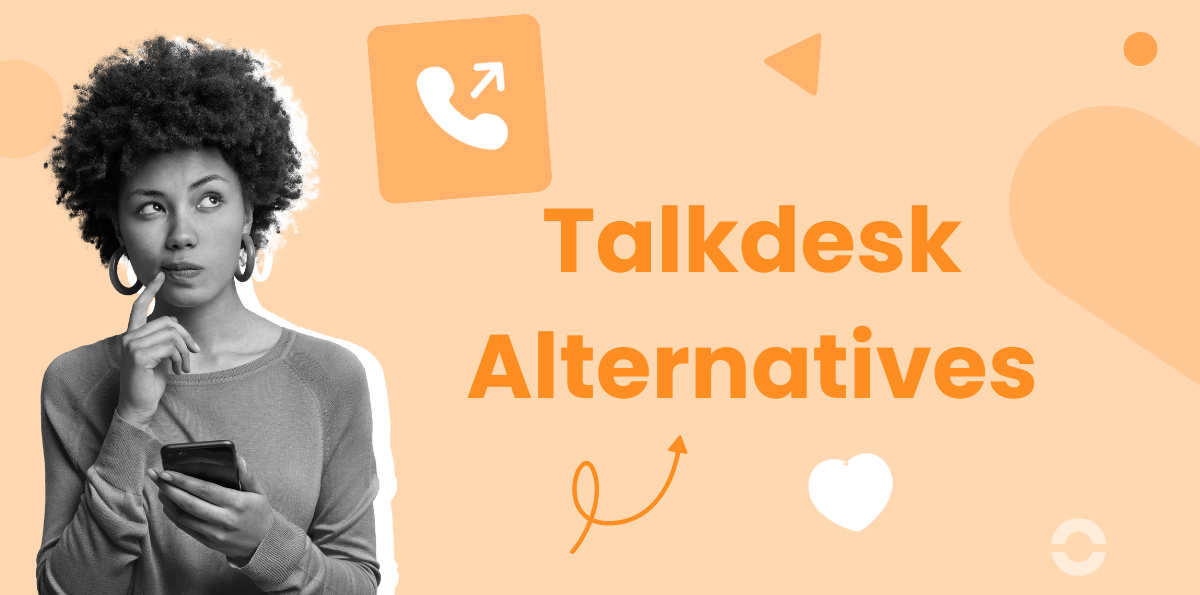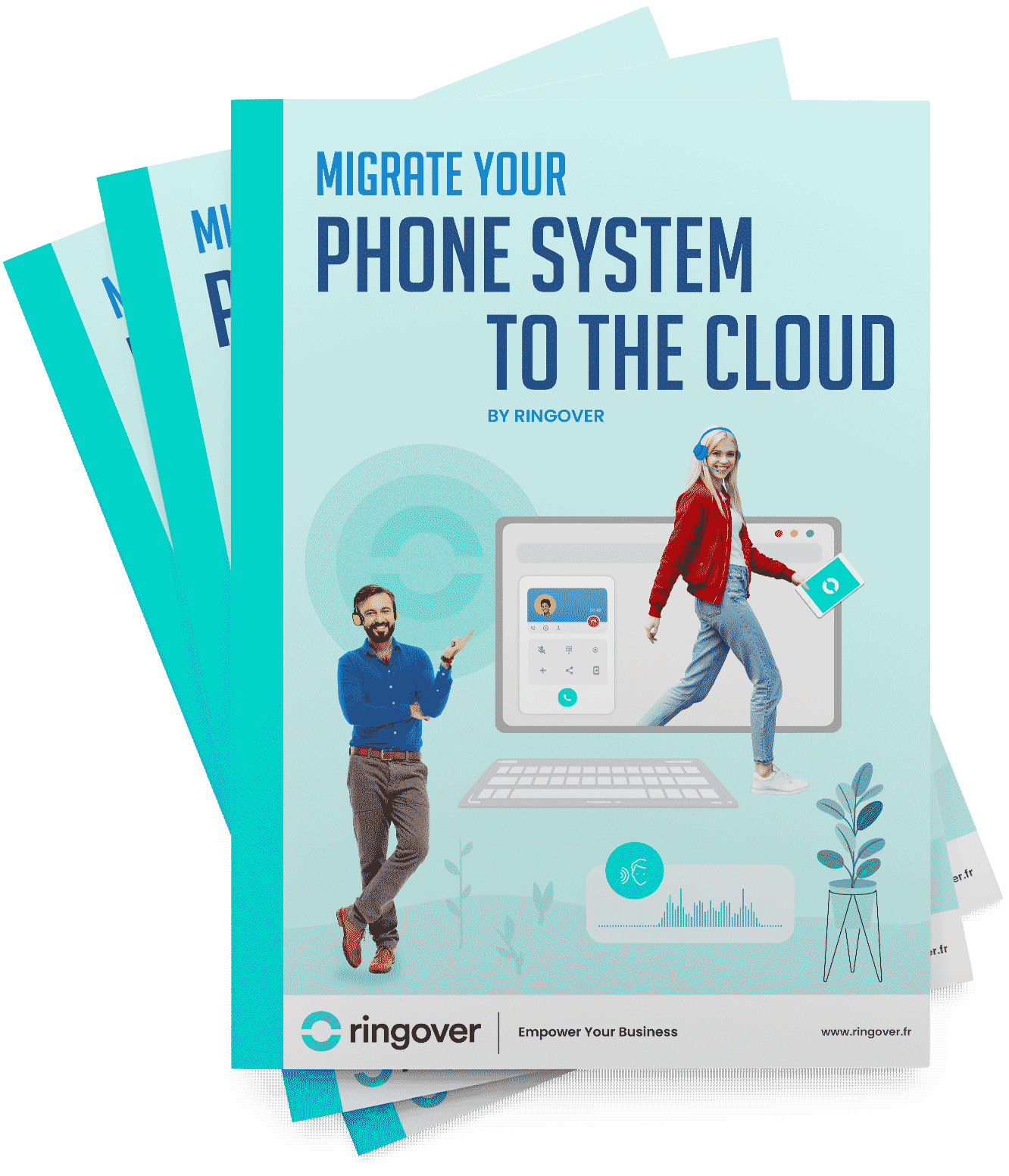Summary
Talkdesk is a well-known cloud-based contact centre solution that has gained significant market presence. It provides a wide range of features designed to help businesses manage customer interactions. However, while Talkdesk is a good business phone system, many organisations actively seek Talkdesk alternatives. The reasons for this search are varied; businesses often look for different solutions due to high costs, integration complexities with their existing technology stack, or the need for specific features not offered by the platform [1].
This article aims to provide a comprehensive review of the top 10 Talkdesk alternatives available. By examining their features, advantages, and pricing, enterprises can identify the VoIP phone that best aligns with their operational and strategic objectives.
Quick Comparison of the Top 10 Talkdesk Competitors
| Provider | Key Advantage | Starting Price | Best For |
|---|---|---|---|
| Ringover | Unlimited calling to 110+ destinations, user-friendly UI, dozens of native integrations, AI technology for call summaries and transcripts. | £17/user/month | SMBs & enterprises needing a scalable, all-in-one solution. |
| Five9 | AI-powered analytics and robust omnichannel contact centre software. | Custom Quote | Large contact centres. |
| Genesys Cloud | Highly customizable, enterprise-grade AI and journey management. | Custom Quote | Large enterprises needing personalised customer experiences. |
| NICE | Advanced workforce engagement management (WEM) and analytics. | Custom Quote | Enterprises focused on workforce optimisation and analytics. |
| 8x8 | Unified platform for UCaaS and CCaaS with global reach. | Custom Quote | Businesses wanting a single vendor for enterprise communication. |
| Nextiva | Unified communications with strong customer support. | Ãbout £35/user/month | Businesses looking for a combined business phone system and contact centre. |
| Dialpad | Real-time AI transcription and sentiment analysis. | No pricing information available in GBP | Sales and support teams focused on AI-driven insights. |
| JustCall | Cloud-based phone system with CRM integrations and AI-powered call insights. | £30/user/month | Small to mid-sized sales and support teams. |
| CloudTalk | User-friendly interface and strong international number support. | No pricing information available in GBP | Global sales and support teams. |
| Vonage | Offers omnichannel communications and API connections. | Prices on request | Small to mid-sized businesses. |
Top 10 Talkdesk Alternatives: An In-Depth Review
1. Ringover
Ringover is a versatile and user-friendly business phone system designed to empower sales and support teams via a range of powerful features like IVR menus, power dialler, surveys, and more. It streamlines workflows by unifying voice, video, and messaging into a single, intuitive omnichannel contact centre software. You can even access multichannel communication channels like social media messaging and WhatsApp.
- Advantages: Ringover offers unlimited calling to over 110 destinations, even on its entry-level plan. It provides advanced analytics through a real-time dashboard and facilitates seamless integrations with major CRMs and helpdesks like Salesforce, Hubspot, Zendesk, and more, ensuring data synchronisation and operational efficiency.
- Pricing: The platform is highly competitive, with plans starting at just £17 per user per month.
For those evaluating different platforms, Ringover stands out as a powerful, all-in-one solution.
2. Five9

Five9 is a leading cloud contact centre solution recognised for its reliability and advanced use of AI-driven automation. It is designed to help large contact centres manage complex customer interactions at scale.
- Advantages: The platform delivers robust omnichannel communication capabilities, allowing agents to engage with customers across voice, email, chat, and social media. Its AI-powered analytics offer valuable insights to improve agent performance and optimise contact centre operations.
- Disadvantages: Its pricing structure is geared toward enterprises, which may make it a costly option for smaller businesses. The platform's extensive feature set can also be complex to configure and manage.
3. Genesys Cloud
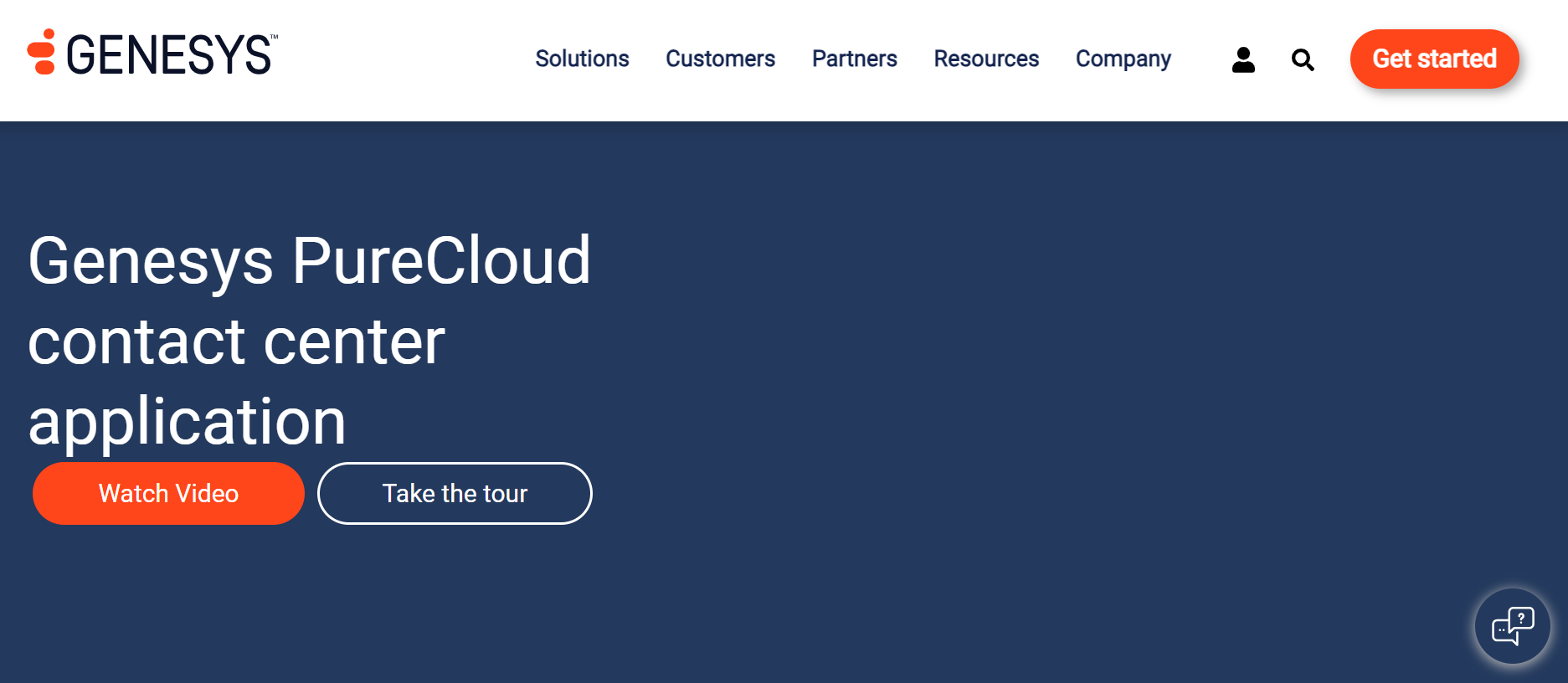
Genesys Cloud is a premier CCaaS platform, consistently recognised by industry analysts for its comprehensive vision and ability to execute.
- Advantages: Genesys excels at delivering AI-enhanced customer experiences through extensive customisation options and powerful customer journey management tools. This allows businesses to orchestrate highly personalised interactions across the entire customer lifecycle. Its leadership status is regularly affirmed, including in the 2025 Gartner Magic Quadrant for Contact Centre as a Service [4].
- Disadvantages: Integration with third-party tools can require additional setup and technical expertise, and the learning curve for administrators can be steep due to the platform's extensive feature set.
4. NICE

NICE is an option for enterprises that prioritise workforce optimisation and deep analytics. Its platform is built to enhance both agent productivity and customer satisfaction.
- Advantages: NICE is a leader in Workforce Engagement Management (WEM), offering a suite of tools for quality management, automated scheduling, and performance analytics. These capabilities help organisations improve operational efficiency and ensure service consistency [5].
- Disadvantages: NICE's complexity and implementation time can be a challenge, and the platform's pricing is not publicly listed. Costs can be significant once licensing, configuration, and training are factored in. Additionally, users have noted that the interface can feel less intuitive compared to newer, more streamlined cloud-based competitors, requiring a longer learning curve for administrators and agents.
5. 8x8
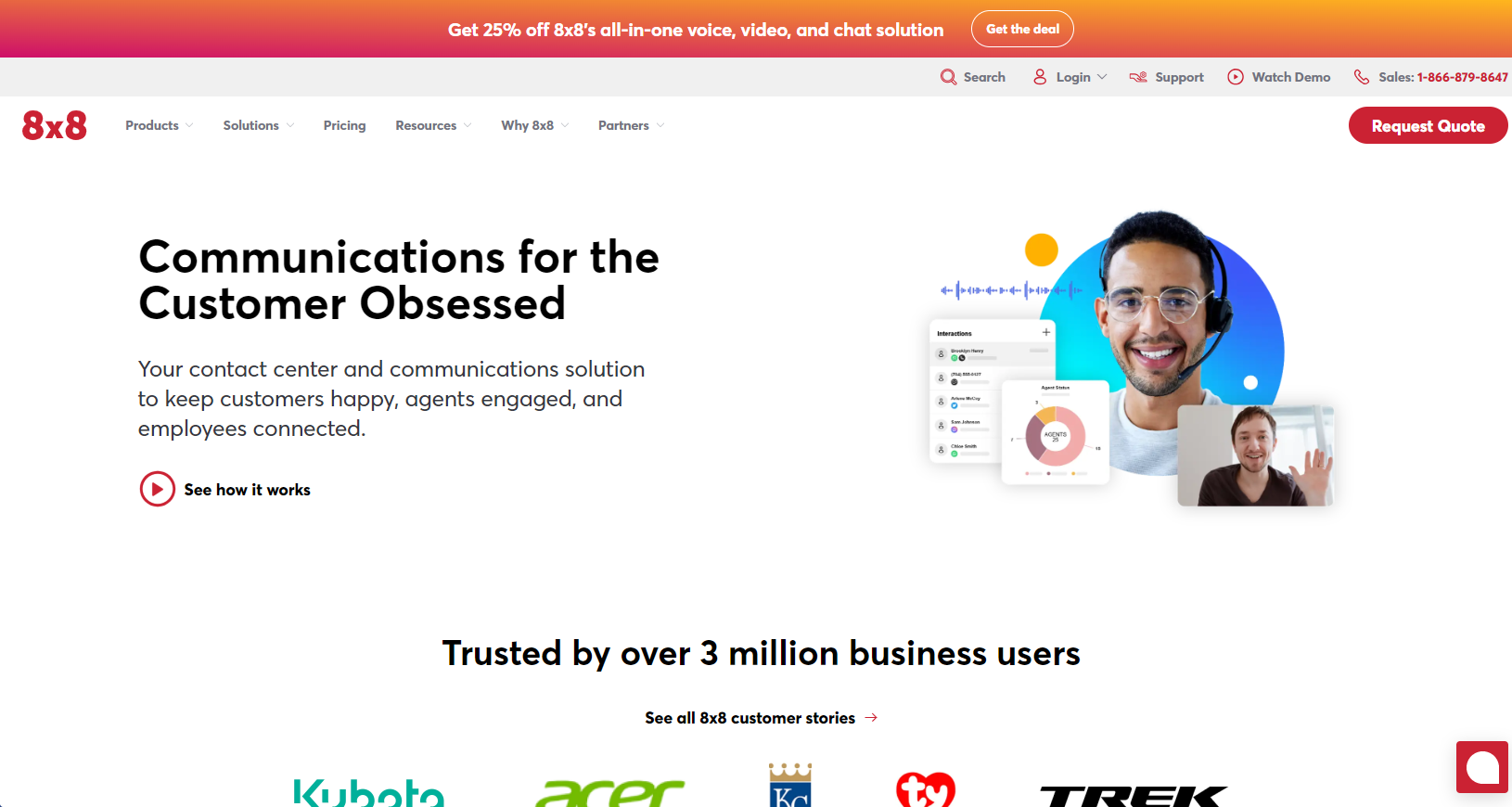
8x8 offers an integrated solution that combines Unified Communications (UCaaS) and Contact Center (CCaaS) onto a single proprietary platform.
- Advantages: This unified approach provides global reach, strong security features, and a single-vendor solution for enterprise business communication needs. It simplifies vendor management and ensures a consistent user experience.
- Disadvantages: The breadth of features can make the platform feel complex for some users. Furthermore, accessing its most advanced capabilities typically requires subscribing to higher-priced plans.
6. Nextiva

Nextiva is a unified communication platform that integrates voice, videocalls, and internal messaging to enhance both customer and team interactions. It is known for its focus on providing a seamless communication experience.
- Advantages: The company is widely praised for its responsive and helpful customer support. Its platform also provides detailed call analytics that help businesses understand communication patterns and improve service quality.
- Disadvantages: Higher-tier plans can be expensive for small businesses. Some users have also reported performance issues with the mobile application.
7. Dialpad
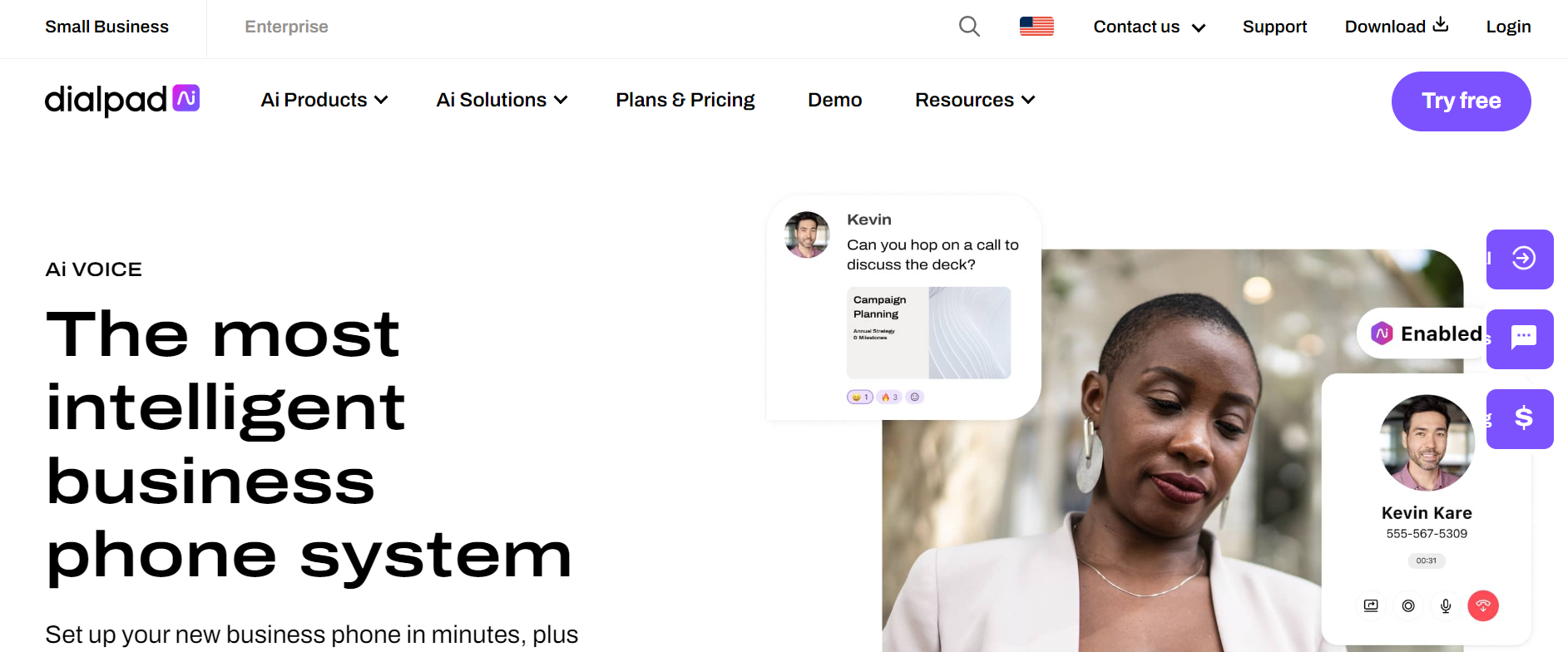
Dialpad is a modern, AI-centric platform that differentiates itself with features like real-time voice transcription and sentiment analysis tools. It is designed for businesses that want to leverage AI for actionable insights.
- Advantages: Dialpad offers a user-friendly interface and a robust mobile app, making it a strong choice for remote and hybrid teams. Its AI features can provide immediate feedback during live calls.
- Disadvantages: Call quality can be heavily dependent on the stability of the user's internet connection. Additionally, its AI-driven features, while innovative, may not always be 100% accurate.
8. JustCall
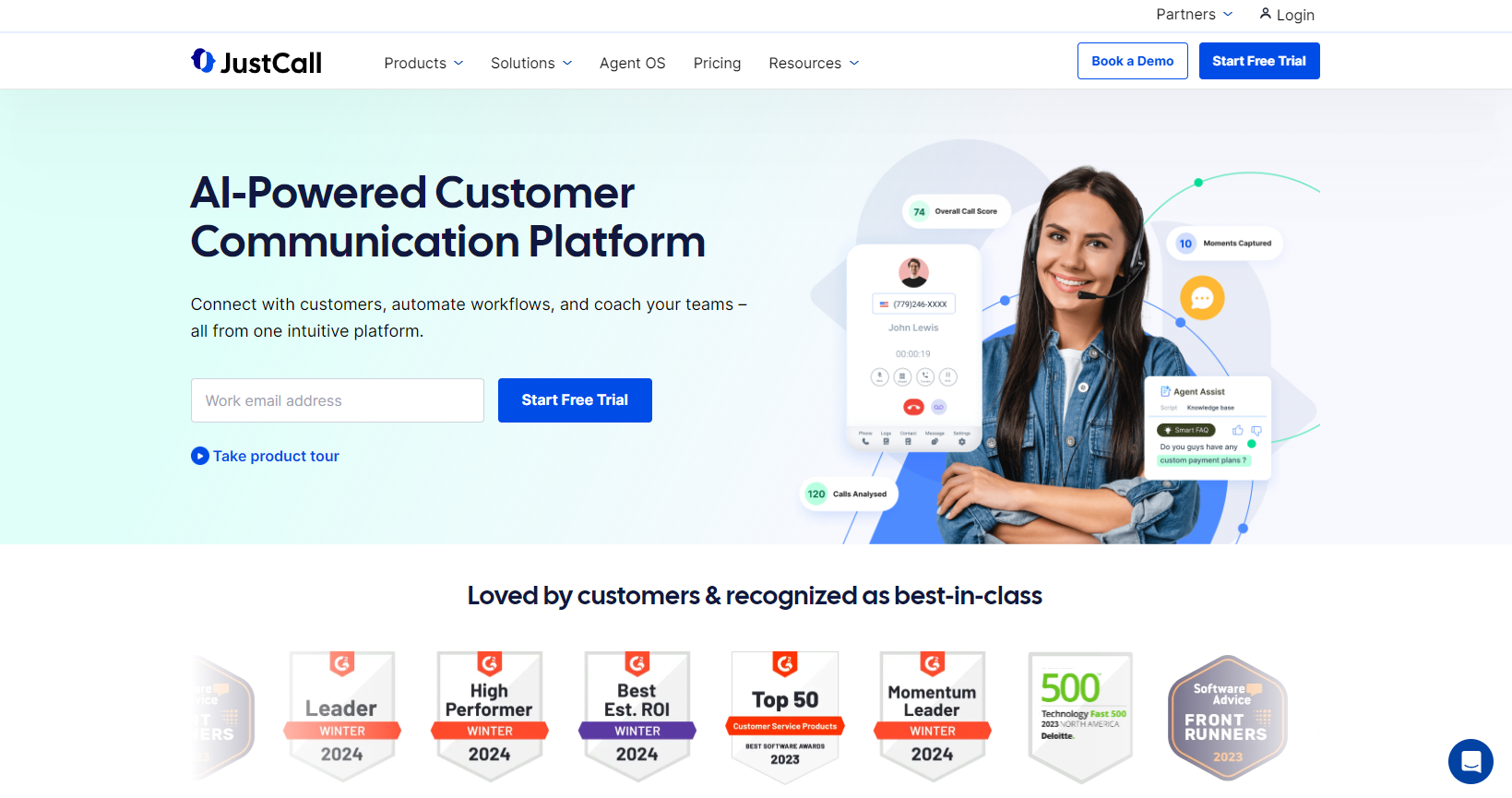
JustCall is a popular cloud telephony platform tailored for sales and support teams that rely on CRM-driven workflows. It's known for integrations with, including HubSpot, Pipedrive, Salesforce, and Zoho, which allow for streamlined call logging and automation. The platform includes AI-powered call analysis, real-time monitoring, and advanced analytics that make it easy to track agent performance and customer sentiment.
- Advantages: JustCall combines simplicity and scalability, making it ideal for small to medium-sized teams looking to professionalise their communications. Its AI features analyse conversations to extract key insights and improve training outcomes, while the intuitive dashboard ensures minimal onboarding time for new users. The platform's pricing is transparent and competitive, starting at £30 per user per month when billed annually.
- Disadvantages: While it's an excellent solution for SMBs, larger enterprises with more complex contact centre needs may find JustCall's analytics and workforce management tools less comprehensive than those offered by enterprise-grade platforms such as Ringover.
9. CloudTalk
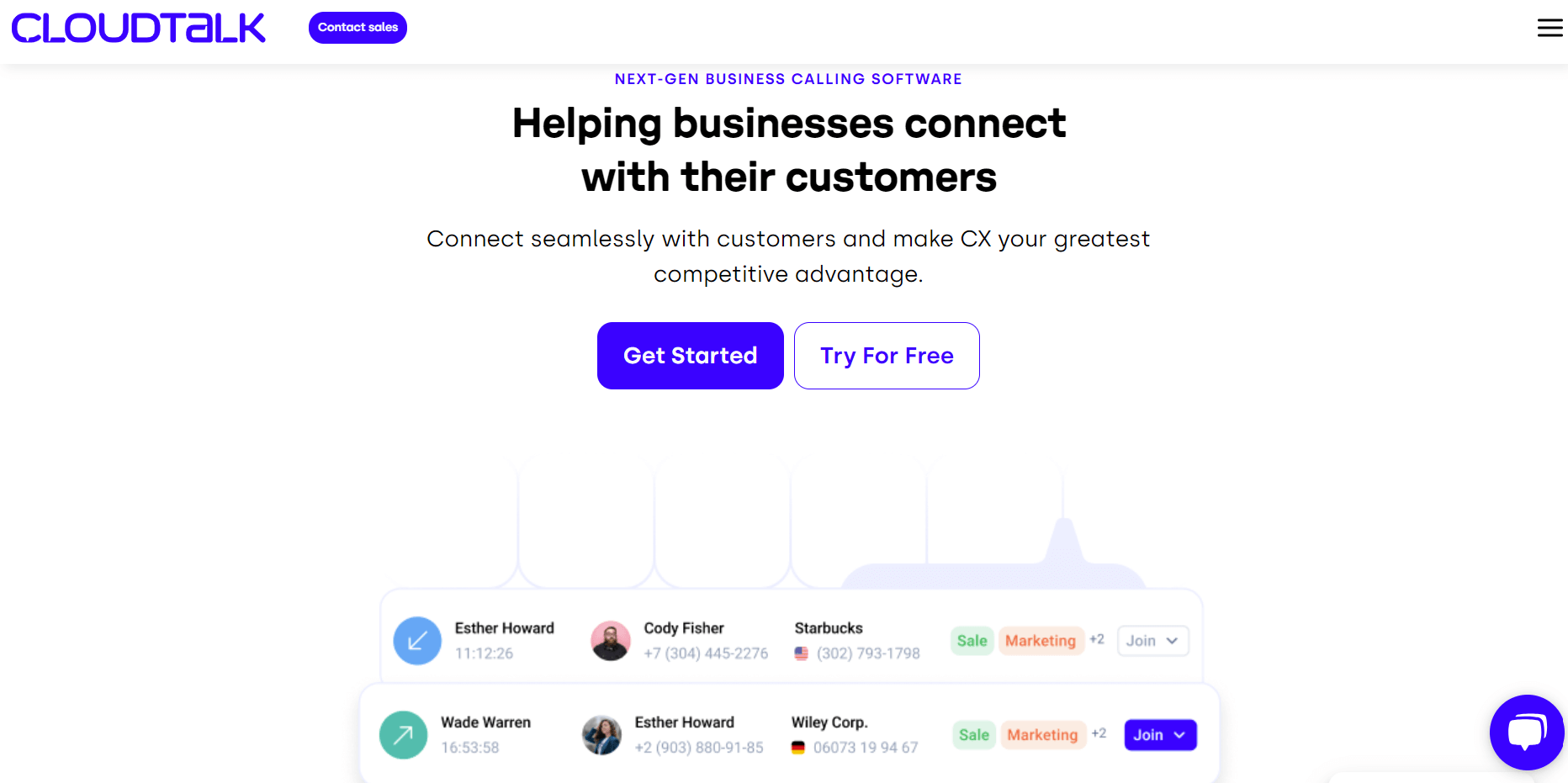
CloudTalk is a contact centre solution designed with a focus on providing an easy-to-use platform for sales and support teams.
- Advantages: It is known for its user-friendly interface with a low learning curve. The platform also offers strong support for international numbers, making it a suitable choice for businesses with global teams and customer bases.
- Disadvantages: The solution can become costly as premium features are added. Its native reporting and analytics options are also more limited compared to some competitors.
10. Vonage
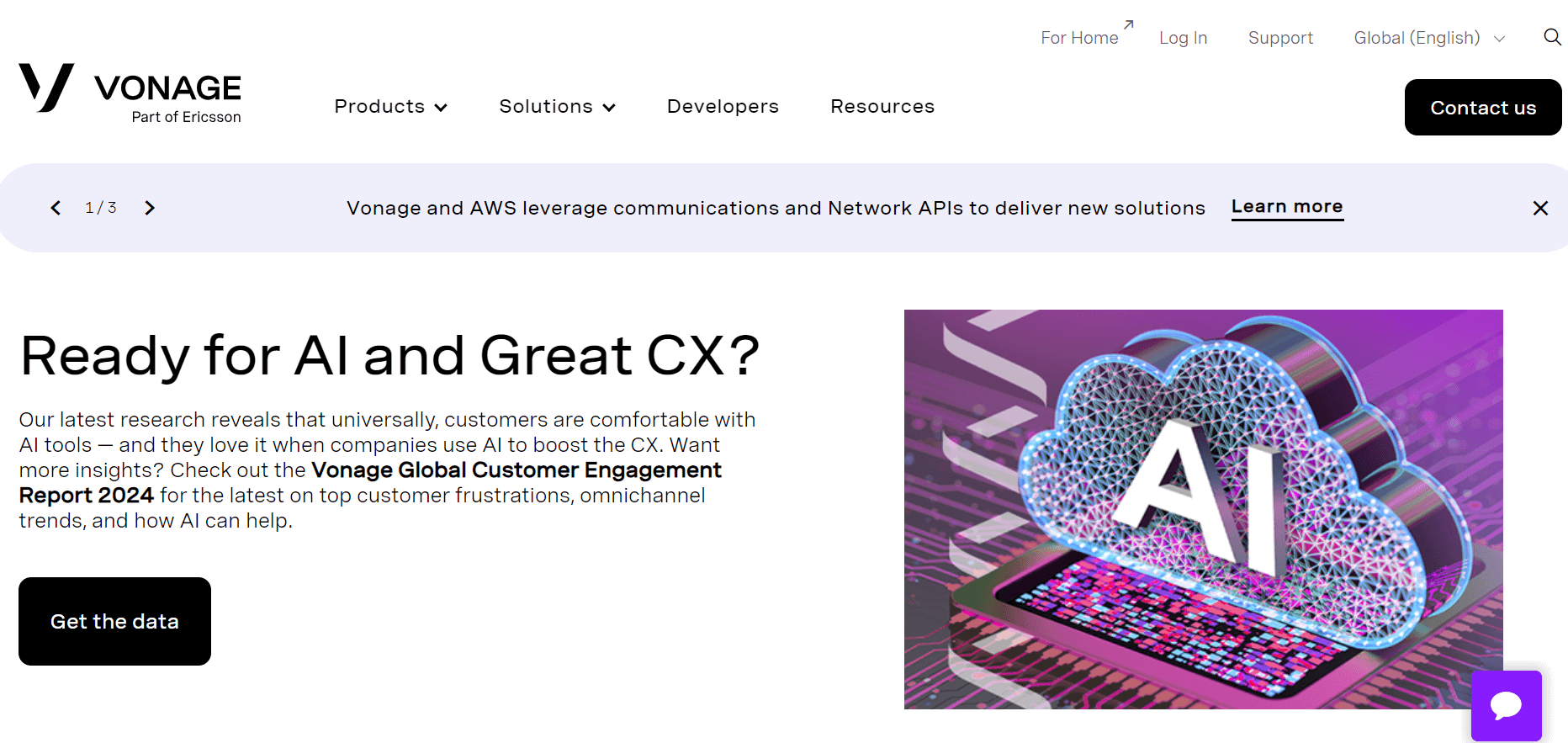
Vonage is a heritage telecommunications software whose main value proposition is its API connections. This option is best for medium businesses who would like the flexibility offered by the APIs.
- Advantages: It offers cloud communications and a variety of more specialised software like contact centre software.
- Disadvantages: There are many add-ons to make the software similar to more comprehensive options like Ringover, which can drive up the price.
Why Look for a Talkdesk Alternative?
Several factors drive users to explore alternatives to Talkdesk. Understanding these common pain points can help clarify what to look for in a new communication platform.
- Complexity and Usability: Some users report that Talkdesk has a steep learning curve and a complex user interface. This can result in extended onboarding times and a need for more user-friendly platforms that agents can adopt quickly [3].
- Integration Needs: While Talkdesk provides various integrations, connecting it with specialised or proprietary systems, such as certain Applicant Tracking Systems (ATS) like Bullhorn or Vincere, may necessitate custom development. In contrast, other providers like Ringover offer a more straightforward approach, with dozens of native integrations on offer.
- Feature Gaps: Businesses may have unique requirements that Talkdesk does not fully address. This could include the need for extensive international calling capabilities at a low cost or industry-specific AI functionalities that are better served by competing providers.
How to Choose the Best Talkdesk Alternative
Selecting the right communication platform requires a careful evaluation of your business needs. Consider the following factors to make an informed decision.
- Assess Your Needs: Begin by identifying your specific requirements. This includes the number of agents, the communication channels you need (voice, SMS, social media, chat), and the essential features your team requires, such as an interactive voice response (IVR) system or automated dialers.
- Check Integration Capabilities: The ideal solution should integrate seamlessly with your existing CRM, helpdesk software, and other business tools. This ensures data synchronisation, automates workflows, and provides a unified view of the customer.
- Consider Scalability: Choose a solution that can grow with your business. The platform should allow you to easily add or remove users, features, and phone lines as your needs evolve without causing significant disruption.
- Evaluate Security and Reliability: Ensure the provider complies with key security standards like GDPR and SOC 2. Investigate their reputation for uptime and call quality to ensure a reliable service for your customers and agents.
- Compare Pricing Models: Look beyond the advertised monthly fee to understand the total cost of ownership. Inquire about any additional charges for add-on features, international calls, number porting, or premium support.
These platforms are all examples of a modern approach to business communications.
Why Ringover Is the Best Talkdesk Alternative
While many excellent options exist, Ringover stands out as the best Talkdesk alternative for a majority of businesses due to its unique combination of power, usability, and value.
- All-in-One Solution: Ringover is a truly unified platform, combining VoIP software, SMS messaging, video conferencing, and a full-featured contact centre into one cohesive system. This eliminates the need for multiple vendors and simplifies your technology stack.
- Cost-Effective Power: With plans starting at just £17 per month, Ringover offers enterprise-grade features at an accessible price point. Crucially, unlimited international calling to over 110 destinations is included in its core plans, a feature that is often a costly add-on with other providers.
- Ease of Use and Setup: The platform features an intuitive interface that requires minimal training, allowing teams to become productive almost immediately. The setup process is straightforward and can be completed in minutes without requiring technical expertise.
- Advanced Analytics & AI: Ringover provides a real-time performance dashboard, AI-powered call summaries, transcription, and coaching tools. These features empower managers to monitor performance, identify trends, and make data-driven decisions to optimise team productivity.
Talkdesk Alternatives FAQ
What are the main disadvantages of Talkdesk?
The most commonly cited disadvantages of Talkdesk are its high cost, especially for smaller teams or those needing advanced features; a complex interface that can be challenging for new users; and a lack of certain specialised features or native integrations required by specific industries.
Is Ringover a good Talkdesk alternative for enterprises?
Yes. Ringover provides a scalable, feature-rich, and cost-effective solution that is well-suited for enterprises. With features like unlimited international calling, advanced analytics, robust integrations, and high security standards, it can meet the demands of large and growing organisations.
Which Talkdesk alternative is best for a small business?
Providers like Ringover, JustCall, and CloudTalk are excellent choices for small businesses. They offer user-friendly interfaces, quick and easy setup, and affordable pricing plans that deliver significant value without requiring a large initial investment.
What is the difference between UCaaS and CCaaS?
UCaaS (Unified Communications as a Service) primarily focuses on internal team collaboration by integrating tools like voice, video conferencing, and instant messaging. CCaaS (Contact Centre as a Service) is designed for managing external customer interactions across multiple channels like voice, email, and chat. Some providers, such as 8x8 and Ringover, offer unified solutions that combine both UCaaS and CCaaS on a single platform.
Citations
- [1]https://sprinklr.com/blog/talkdesk-alternatives
- [2]https://nobelbiz.com/blog/talkdesk-alternatives-competitors-2025
- [3]https://trellus.ai/post/best-talkdesk-alternatives
- [4]https://genesys.com/resources/gartner-magic-quadrant-for-contact-center-as-a-service
- [5]https://calabrio.com/blog/best-talkdesk-alternatives
Published on October 14, 2025.
